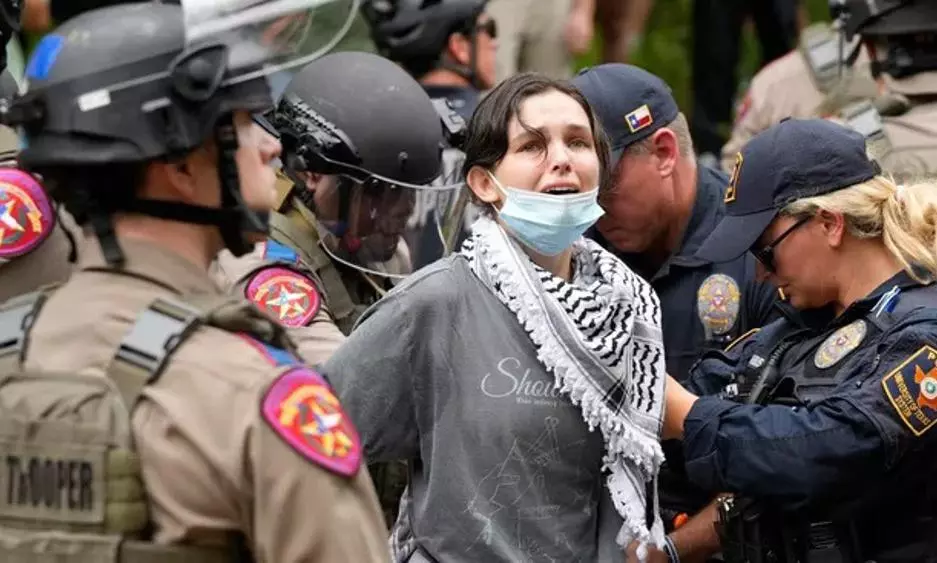
Silencing US campuses for Israel undermines US democratic values
text_fieldsThe recent crackdown on pro-Palestinian campus activism across the United States exposes a troubling double standard in how universities handle free speech. While rhetoric critical of Israeli policies is swiftly condemned and restricted, activism against other regimes, even those with poor human rights records, do not face the same scrutiny. This selective outrage stifles debate, marginalizes dissenting voices, and undermines the principles of academic freedom that universities claim to uphold.
This approach, evident most recently in Berkeley Law School Dean Erwin Chemerinsky’s opinion piece in The New York Times calling on campuses to clamp down on pro-Palestinian protests, raises troubling questions about selective condemnation and the broader implications for free speech on college campuses (“College Officials Must Condemn On-Campus Support for Hamas Violence,” Oct. 20, 2024).
By selectively condemning Palestinian resistance to Israeli occupation while offering only a muted critique of Israel’s ongoing actions, U.S. universities are, in fact, legitimizing a narrative that selectively applies principles of free speech at various campus events.
While campus supporters of Israel are right to decry rhetoric celebrating Hamas’s actions, they often only offer a tepid acknowledgement of Israel’s ongoing destruction in Gaza. This narrow focus on protecting the sensitivities of Zionist or even Jewish students while minimizing or ignoring Palestinian suffering reveals a deeper flaw in their argument: a conflation of Jewish identity with Zionism and the resulting repression of legitimate expressions of support for the Palestinian struggle.
One of the most significant issues with this line of thinking is the failure to distinguish between anti-Israel protests and anti-semitism. The assumption that opposition to Israeli policies creates a hostile environment for Jewish students promotes the false claim that all Jews support Israeli actions or the equally flawed doctrine that Israel acts on behalf of global Jewry. This narrative erases the voices of the many Jews who stand against Israel’s occupation and decades-long apartheid regime.
Contrary to these faulty assumptions, evidence shows that a growing number of Jewish students and faculty advocate for Palestinian rights, often from a non-Zionist or anti-Zionist perspective. The failure to recognize this distinction reinforces a dangerous narrative that equates criticism of Israel with hostility toward Jewish identity, a deliberately false premise that weaponizes the horrors of anti-semitism to stifle legitimate, on-campus debate.
On October 21, 2024, at the University of Minnesota, for instance, eleven pro-Palestinian protesters were arrested for occupying an administrative building while calling for divestment from Israel (Michelle Murphy, “11 pro-Palestinian protesters arrested at University of Minnesota,” Oct. 22, 2024, ABC News). This group were but a part of a few of a much larger punitive push across the country.
In just six months, more than 3,000 people have been arrested nationwide for engaging in pro-Palestine advocacy on college campuses. Institutions that once prided themselves on championing free speech have now become hostile environments for those opposing Israeli violence against civilian populations. The U.S. Department of Education has further intensified this repression by pressuring universities to take aggressive steps to curb antisemitism.
In at least one instance, the DOE went so far as to claim that anti-genocide protests may have created a “hostile environment,” conflating legitimate criticism of Israeli policies with hate speech (Ahmad Ibsais. “For US universities, Arab and Muslim lives do not matter,” Oct. 19, 2024, Aljazeera). This shift undermines the open debate that universities are supposed to foster, chilling free expression and disproportionately silencing pro-Palestinian voices.
Meanwhile, the experiences of Palestinian students and their allies are ignored. Earlier this semester, a leaked recording of Santa J. Ono, the University of Michigan president, for example, revealed a disturbing bias within universities, with powerful groups pressuring administrators to combat antisemitism while disregarding Islamophobia and anti-Palestinian hate (Layla McMurtrie, “The recording indicates that the institution risks losing $2 billion in federal funding if it fails to follow directives focusing on antisemitism,” Oct. 9, 2024, Detroit Metro Times).
This unbalanced approach results in Arab, Muslim, and other non-Zionist or anti-Zionist students feeling unsafe or unwelcome while universities prioritize Zionist perspectives and silence Palestinian, Arab, and other Muslim voices.
Across American campuses, new restrictions have been implemented to stifle these protests. Indiana University enacted an “expressive activity policy” that bans protests after 11 p.m., prohibits camping, and requires pre-approval for signs (Annie Ma, “American universities accused of attacks on free speech with strict campus protest rules,” The Independent). These measures specifically target pro-Palestinian voices, prompting the question: should similar restrictions apply to protests against Saudi Arabia or Iran because they could be considered anti-Arab hate or Islamophobia?
There is, of course, an argument that suggests that celebrating violence against civilians is both an ethical and political mistake. Such rhetoric distracts from the legitimate cause of Palestinian liberation and gives opponents a pretext to discredit the entire movement. However, those campaigning to shut down Palestinian activism go beyond condemning extremist rhetoric.
Rather, these efforts form only a part of a broader effort to undermine all forms of Palestinian resistance, even those grounded in international law. By focusing solely on those who justify violence, these critics fail to address the root causes of the conflict: The Israeli occupation of historical and contemporary Palestine, systematic state-sanctioned and settler violence against Palestinian civilians, and innumerable methods of inhuman oppression that drive Palestinian resistance. Their selective outrage paints a one-sided narrative, leaving little room for a nuanced discussion on the ethics and legality of Palestinian resistance.
Ultimately, one-sided condemnations are a danger to free speech on campus. They selectively condemn expressions of solidarity with Palestine, while protecting inherently violent Zionist narratives, silencing both Palestinian voices and anti-Zionist Jewish voices.
If universities genuinely value free speech, they must condemn all forms of violence -- whether it is the celebration of attacks on Israel or the defence of Israel’s war crimes in Gaza. Anything less is an endorsement of selective repression, a betrayal of free speech principles, and a denial of the fundamental rights of the Palestinian people.
Faisal Kutty is a Toronto-based lawyer and regular contributor to The Toronto Star. His articles also appear in Newsweek, Aljazeera, Zeteo, and Middle East Eye. You can follow him on X @faisalkutty)























